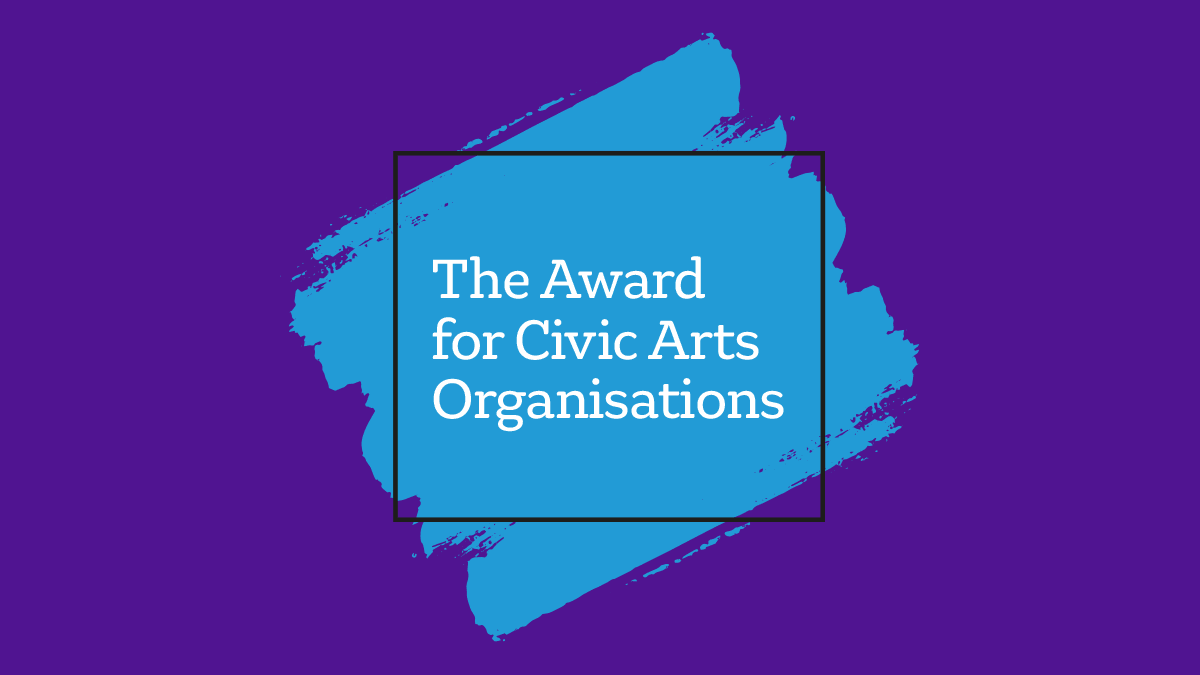Working on this project has been incredibly illuminating. The work the shortlisted organisations have done during the pandemic has expertly demonstrated the many ways the arts can nourish and support the communities to which they belong.
Jonathan Vickers, MA Arts & Cultural Management student
10 March 2021
Awardees announced for the £150,000 Award for Civic Arts Organisations
King’s CMCI students explored the civic role of arts as part of the project

Today, in a virtual Awards celebration hosted by Kwame Kwei-Armah OBE (Artistic Director, Young Vic) the four awardees for The Award for Civic Arts Organisations were announced.
London based arts organisation Heart n Soul who consulted a steering group of their members to co-create an online programme of activities for those with learning disabilities, including club nights, quizzes, baking sessions and an online gallery of artwork resulting from creative packs which were posted out every fortnight, took along the main award of £75,000.
Three awards of £25,000 went to organisations in Inverness, London and Manchester. Eden Court Highlands formed a partnership with the Highland Council and re-purposed their staff team and facilities as the humanitarian aid centre for the region. Their work with the community included activities for children of keyworkers, packing and distributing thousands of food parcels each week, and turning the venue’s restaurant windows into a temporary community exhibition site to display a collection of Black Lives Matter banners.
The Museum of Homelessness in London co-created a community-led COVID-19 homeless taskforce and published a plan to help the homeless community – to block book empty hotel rooms for the community to self-isolate, which was adopted as national strategy to bring 29,000 people into safe accommodation. The taskforce formed a group of 50 volunteers partnering with the council and many local organisations, to produce and distribute meals and connect with those in isolation.
The Whitworth in Manchester rewrote its mission to respond to the extreme social inequities exposed by the pandemic, adhering to three key principles: learning through making and doing; creating a place of care, consideration, and community; and taking action. The Whitworth’s expanded online programme engaged almost 300,000 people throughout the pandemic.
Launched in November 2020, the Award seeks to highlight some of the inspiring ways in which arts organisations have connected with their communities and responded to the COVID-19 pandemic. It is funded by the Calouste Gulbenkian Foundation (UK Branch), with King’s College London as the academic partner to deliver the Award.
Out of 260 overall and 37 longlisted submissions, the judging panel, chaired by Baroness Deborah Bull, shortlisted ten arts organisations which put their communities first and responded to local needs throughout the pandemic.
As the emerging cultural leaders, the students reflect on what truly impressed them about the organisations’ extraordinary response, exemplifying the civic role of art at a time when it could not have mattered more.
Baroness Deborah Bull, Vice President & Vice-Principal (London) and the Senior Advisory Fellow for Culture at King’s College London
Emerging cultural leaders
Ten Masters students from the Department of Culture, Media & Creative Industries in the Faculty of Arts & Humanities had the chance to explore and capture the depth and breadth of the shortlisted organisations in case studies for the Award publication.
After an initial desk research phase, the students (virtually) embarked on a micro-placement with their respective organisation to investigate their strategies, challenges, and learnings in this most difficult of years.
Getting the opportunity to have conversations with the people behind an arts organisation which is so closely knit with its community has really had an impact on the way I think about the arts and culture in relation to communities and society at large. This experience has inspired me and consequently had a positive impact on my future career visions. I am grateful for having had the opportunity to have multiple conversations, with divergent stakeholders, about the increasingly civic role arts organisations have to play in society today.
Þórhildur Tinna Sigurðardóttir, MA Arts & Cultural Management student
